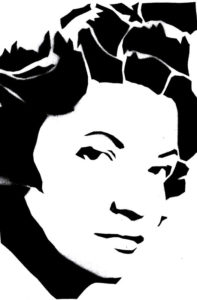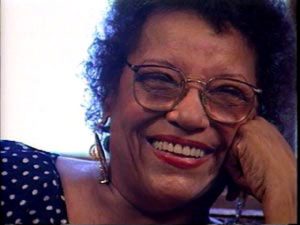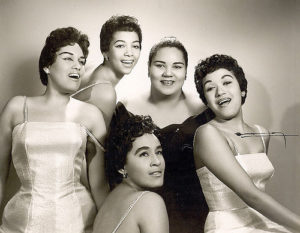Ivetter Cepeda, Vania Borges, Yaima Sáez and Omara Portuondo, will join in a tribute to Elena Burke, one of the best Cuban singers of all time, on February 28 in the Sala Covarrubias of the National Theater. Also invited are the troubadours Raúl Torres and Nelson Díaz.
In the Sala Covarrubias also opens an exhibition of digital art, plastic artist Santos Toledo that covers the personal and artistic life of the popular singer born in 1928 and died in 2002, and that would meet on 28 years ninety years. That is why this concert-tribute was organized, directed by Lester Hamlet, who conceived the show as a kind of serenade, basically on guitar, very close to the interpretative style of Senora Sentimiento, as he was also known.
In the concert you will hear great successes of Elena as ‘The material’, ‘If you understood me’, ‘I am not your friend’, ‘A thousand anguish’, ‘Hurts’, ‘They told me about you’ and ‘Words’. In the Sala Villena of the UNEAC, at three o’clock on the afternoon of February 28, there is a conversation on Elena Burke in which the renowned Cuban intellectuals Nancy Morejón, Olga Navarro, Pedro de la Hoz and Sigfredo Ariel will speak.
The career of Elena Burke began on the radio at the end of the 1940s, at the Supreme Court of Art. Before starting a solo career, Elena belonged to the group Las Mulatas de Fuego (1947), the trio Las Cancioneras and the quartets of Facundo Rivero, Orlando de La Rosa and the pianist Aida Diestro. Precisely the quartet Las D’Aida, together with Moraima Secada and Omara and Haydée Portuondo, was constituted, since 1952, as the best female vocal ensemble in the history of Cuban music.
In 1959 he recorded with Meme Solís the full length album La Burke canta, and the show chroniclers proclaimed him “The best performer of the year”, it was in the sixties when his contralto voice became the protagonist of the filin, although he also cultivated the bolero, the pop song, the son and the romantic ballad.
From this time, she acquired enormous prestige for singing a capella, or accompanied only by a guitar, in the nocturnal and bohemian atmospheres of that time because she was the queen of Saint John, the 21 Club, the White Peak. But he was also accompanied by great orchestras, as in ‘Persistiré’ by Rubén Rodríguez, which he popularized with the Aragón orchestra in 1967, or ‘Si te contarra’ (Felix Reyna) and ‘Me encontra’ (Tania Castellanos), in which is accompanied by Enrique Jorrín’s orchestra.
Gradually, Elena became the best interpreter of important Cuban composers: José Antonio Méndez (The glory is you, If you understood me, I was missing you), César Portillo de la Luz (You, my delirium, Son al son), Frank Domínguez (Refúgiate in me, You will remember me), Pilot and Vera (Hurts, My feeling), Marta Valdés (Cries, Words), Juan Formell (Of my Memories, The Material) and Pablo Milanes (My 22 years, You came to my open body, Love me as I am), among many others.
Elena Burke kept singing, with her voice intact and splendid, until the last of her days. He offered a final concert sitting in a wheelchair at the National Theater. The public prefers to remember her as the absolute owner of the stage, as in that famous gala of the Guzmán contest, when she flooded the immense space of Karl Marx singing Del son al son, together with the Orquesta Aragón.
ELENA BURKE, UNA DE LAS MÁS GRANDES CANTANTES DE LA MÚSICA CUBANA.
Ivetter Cepeda, Vania Borges, Yaima Sáez y Omara Portuondo , se unirán en un homenaje a Elena Burke, una de las mejores cantantes cubanas de todos los tiempos, el próximo 28 de febrero en la Sala Covarrubias del Teatro Nacional. También están invitados los trovadores Raúl Torres y Nelson Díaz.
En la Sala Covarrubias también se inaugura una exposición de arte digital, del artista de la plástica Santos Toledo que recorre la vida personal y artística de la popular cantante nacida en 1928 y fallecida en 2002, y que cumpliría el día 28 noventa años. Es por ello que se organizó este concierto-homenaje, dirigido por Lester Hamlet, quien concibió el espectáculo como una suerte de serenata, básicamente a guitarra, muy cerca del estilo interpretativo de la Señora Sentimiento, como también se le conocía.
En el concierto se escucharán grandes éxitos de Elena como ‘Lo material’, ‘Si me comprendieras’, ‘Yo no soy tu amiga’, ‘Mil congojas’, ‘Duele’, ‘Me contaron de ti’ y ‘Palabras’. En la Sala Villena de la UNEAC, a las tres de la tarde del 28 de febrero, hay un coloquio sobre Elena Burke en el que intervendrán los reconocidos intelectuales cubanos Nancy Morejón, Olga Navarro, Pedro de la Hoz y Sigfredo Ariel.
La carrera de Elena Burke se inició en la radio a finales de los años cuarenta, en la Corte Suprema del Arte. Antes de iniciar carrera como solista, Elena perteneció al conjunto Las Mulatas de Fuego (1947), el trío Las Cancioneras y los cuartetos de Facundo Rivero, Orlando de La Rosa y de la pianista Aida Diestro. Precisamente el cuarteto Las D’Aida, junto a Moraima Secada y Omara y Haydée Portuondo, se constituyó, desde 1952, como el mejor conjunto vocal femenino de la historia de la música cubana.
En 1959 graba con Meme Solís el disco de larga duración La Burke canta, y los cronistas de espectáculos la proclaman “La mejor intérprete del año”, es en los años sesenta cuando su voz de voz de contralto devino protagonista del filin, aunque también cultivó el bolero, la canción pop, el son y la balada romántica.
Desde esta época, adquirió enorme prestigio por cantar a capela, o acompañada solo por una guitarra, en los ambientes nocturnos y bohemios de aquel entonces pues fue la reina del Saint John, el Club 21, el Pico Blanco. Pero también se hizo acompañar por grandes orquestas, como ocurre en ‘Persistiré’, de Rubén Rodríguez, que popularizó con la orquesta Aragón en 1967, o ‘Si te contara’ (Félix Reyna) y ‘Me encontrarás’ (Tania Castellanos), en las cuales es acompañada por la orquesta de Enrique Jorrín.
Paulatinamente, Elena devino la mejor intérprete de importantísimos compositores cubanos: José Antonio Méndez (La gloria eres tú, Si me comprendieras, Me faltabas tú), César Portillo de la Luz (Tú, mi delirio, Son al son), Frank Domínguez (Refúgiate en mí, Me recordarás), Piloto y Vera (Duele, Mi sentimiento), Marta Valdés (Llora, Palabras), Juan Formell (De mis Recuerdos, Lo Material) y Pablo Milanés (Mis 22 años, Llegaste a mi cuerpo abierto, Ámame como soy), entre muchos otros.
Elena Burke se mantuvo cantando, con su voz intacta y espléndida, hasta el último de sus días. Ofreció un último concierto sentada en silla de ruedas, en el Teatro Nacional. El público prefiere recordarla dueña absoluta del escenario, como en aquella célebre gala del concurso Guzmán, cuando inundó el inmenso espacio del Karl Marx cantando Del son al son, junto a la Orquesta Aragón.
Agencies/Joel del Rio/Jiribilla/CiberCuba/Internet Photos/YouTube/ Extractos/ Arnoldo Varona/ TheCubanHistory.com
THE CUBAN HISTORY, HOLLYWOOD.







